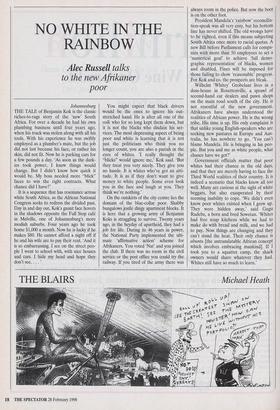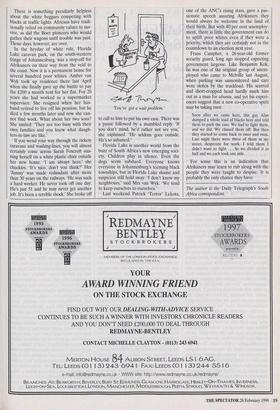NO WHITE IN THE RAINBOW
Alec Russell talks
to the new Afrikaner poor
Johannesburg THE TALE of Benjamin Kok is the classic riches-to-rags story of the 'new' South Africa. For over a decade he had his own plumbing business until four years ago, when his truck was stolen along with all his tools. With his experience he was swiftly employed as a plumber's mate, but the job did not last because his face, or rather his skin, did not fit. Now he is parking cars for a few pounds a day. 'As soon as the dark- ies took power, I knew things would change. But I didn't know how quick it would be. My boss needed more "blick" faces to win the right contracts. What chance did I have?'
It is a sequence that has resonance across white South Africa, as the African National Congress seeks to redress the divided past. Day in and day out, Kok's gaunt face hovers in the shadows opposite the Full Stop café in Melville, one of Johannesburg's more modish suburbs. Four years ago he took home $1,000 a month. Now he is lucky if he makes $80. He cannot afford a night off if he and his wife are to pay their rent. 'And it is so embarrassing. I see on the street peo- ple I went to school with, with nice houses and cars. I hide my head and hope they don't see. . . . ' You might expect that black drivers would be the ones to ignore his out- stretched hand. He is after all one of the yolk who for so long kept them down, but it is not the blacks who disdain his ser- vices. The most depressing aspect of being poor and white is learning that it is not just the politicians who think you no longer count, you are also a pariah in the eyes of whites. 'I really thought the "Wicks" would ignore me,' Kok said. 'But they treat you very nicely. They give you no hassle. It is whites who've got an atti- tude. It is as if they don't want to give money to white people. Some even look you in the face and laugh at you. They think we're nothing.'
On the outskirts of the city centre lies the domain of the blue-collar poor. Shabby bungalows jostle dingy apartment blocks. It is here that a growing army of Benjamin Koks is struggling to survive. Twenty years ago, in the heyday of apartheid, they had a job for life. During its 46 years in power, the National Party implemented the ulti- mate 'affirmative action' scheme for Afrikaners. You voted 'Nat' and you joined the club. If there was no room in the civil service or the post office you could try the railway. If you tired of the army there was always room in the police. But now the boot is on the other foot.
President Mandela's 'rainbow' reconcilia- tion-speak was all very cosy, but his bottom line has never shifted. The old wrongs have to be righted, even if this means subjecting South Africa once more to racial quotas. A new Bill before Parliament calls for compa- nies with more than 50 employees to set a `numerical goal' to achieve 'full demo- graphic representation' of blacks, women and disabled. Fines will be imposed for those failing to show 'reasonable' progress. For Kok and co. the prospects are bleak.
Wilhelm 'Whitey' Grobelaar lives in a doss-house in Rosettenville, a sprawl of second-hand car dealers and pawn shops on the main road south of the city. He is not resentful of the new government. Afrikaners have always understood the realities of African power. He is the wrong tribe. His time is up. His only complaint is that unlike young English-speakers who are seeking new pastures in Europe and Aus- tralia, he has nowhere to go. 'You can't blame Mandela. He is bringing in his peo- ple. But you and me as white people, what chance have we got?'
Government officials mutter that poor whites had their chance in the old days, and that they are merely having to face the Third World realities of their country. It is indeed a scenario that blacks know all too well. Many are curious at the sight of white beggars, but also exasperated by their seeming inability to cope. 'We didn't even know poor whites existed when I grew up. They were hidden away,' said Gugu Radebe, a born and bred Sowetan. 'Whites had free soup kitchens while we had to make do with bread and milk, and we had to pay. Now things are changing and they can't stand the heat. Their only chance is ubuntu [the untranslatable African concept which involves embracing mankind]. If I took you to a squatter camp, the shack owners would share whatever they had. Whites still have so much to learn.' There is something peculiarly helpless about the white beggars competing with blacks at traffic lights. Africans have tradi- tionally relied on community values to sur- vive, as did the Boer pioneers who would gather their wagons until trouble was past. Those days, however, are over.
In the heyday of white rule, Florida Lake caravan park, on the south-western fringe of Johannesburg, was a stop-off for Afrikaners on their way from the veld to the coast. Now it is a permanent home for several hundred poor whites. Amber van Wyk took up residence there last April when she finally gave up the battle to pay the £200 a month rent for her flat. For 20 years she had worked as a supermarket supervisor. She resigned when her hus- band retired to live off his pension, but he died a few months later and now she can- not find work. What about her two sons? She smiled: 'They are too busy with their own families and you know what daugh- ters-in-law are like.'
If you wend your way through the rickety caravans and washing-lines, you will almost certainly come across Sarah Foxcroft sun- ning herself on a white plastic chair outside her new home. am always here,' she chuckles. 'It's nice, don't you think?' Her `Jimmy' was made redundant after more than 30 years on the railways. 'He was such a hard worker. He never took off one day. He's just 51 and he may never get another job. It's been a terrible shock.' She broke off 'You've got a wait problem.'
to call to him to put his own case. There was a pause followed by a mumbled reply. 'If you don't mind, he'd rather not see you,' she explained. 'He seldom goes outside. He's so ashamed.'
Florida Lake is another world from the buzz of South Africa's new emerging soci- ety. Children play in silence. Even the dogs seem subdued. Everyone knows everyone in Johannesburg's teeming black townships, but in Florida Lake shame and suspicion still hold sway. 'I don't know my neighbours,' said Mrs van Wyk. 'We tend to keep ourselves to ourselves.'
Last weekend Patrick 'Terror' Lekota, one of the ANC's rising stars, gave a pas- sionate speech assuring Afrikaners they would always be welcome in the land of their birth. But with 40 per cent unemploy- ment, there is little the government can do to uplift poor whites even if they were a priority, which they are certainly not in the countdown to an election next year.
Frans Campher, a 28-year-old former security guard, long ago stopped expecting government largesse. Like Benjamin Kok, he was one of the original group of unem- ployed who came to Melville last August, when parking was unmonitored and cars were stolen by the truckload. His scarred and short-cropped head hardly mark him out as a man for ubuntu, and yet his experi- ences suggest that a new co-operative spirit may be taking root: Soon after we came here, this guy Alan dumped a whole load of blacks here and told them to park the cars. We had to fight them, and we did. We chased them off. But then they started to come back in ones and twos. Last night there were three of them in my street, desperate for work. I told them I didn't want to fight . . . So we divided it in half and we each took one side.
For some this is an indication that Afrikaners may learn to rub along with the people they were taught to despise. It is probably the only chance they have.
The author is the Daily Telegraph's South Africa correspondent.



























































 Previous page
Previous page